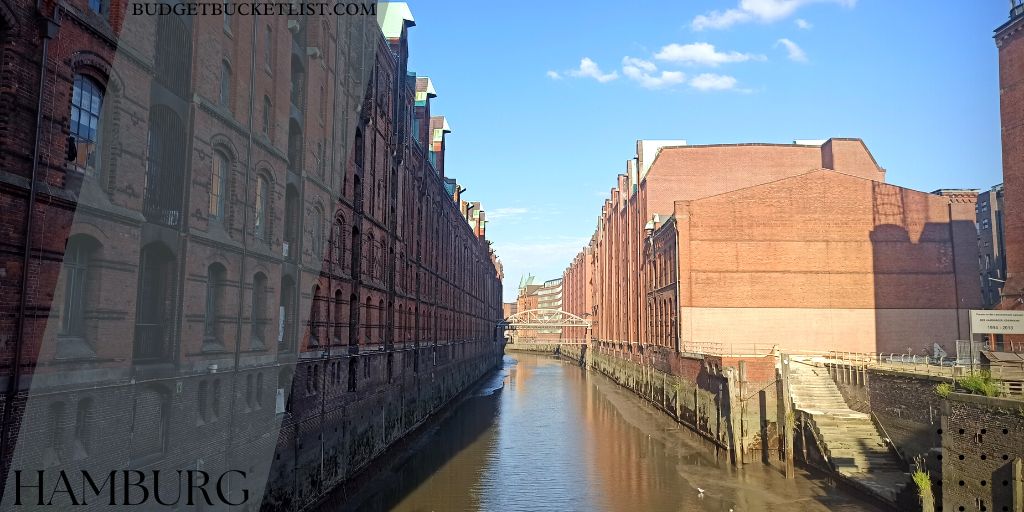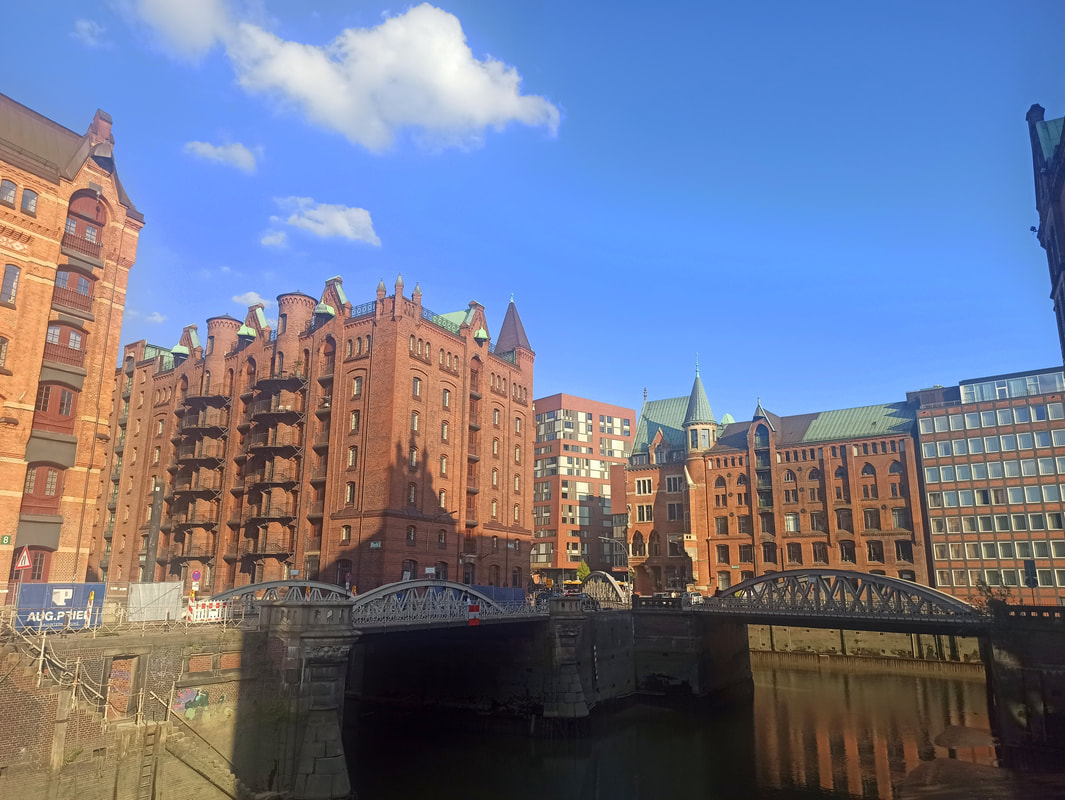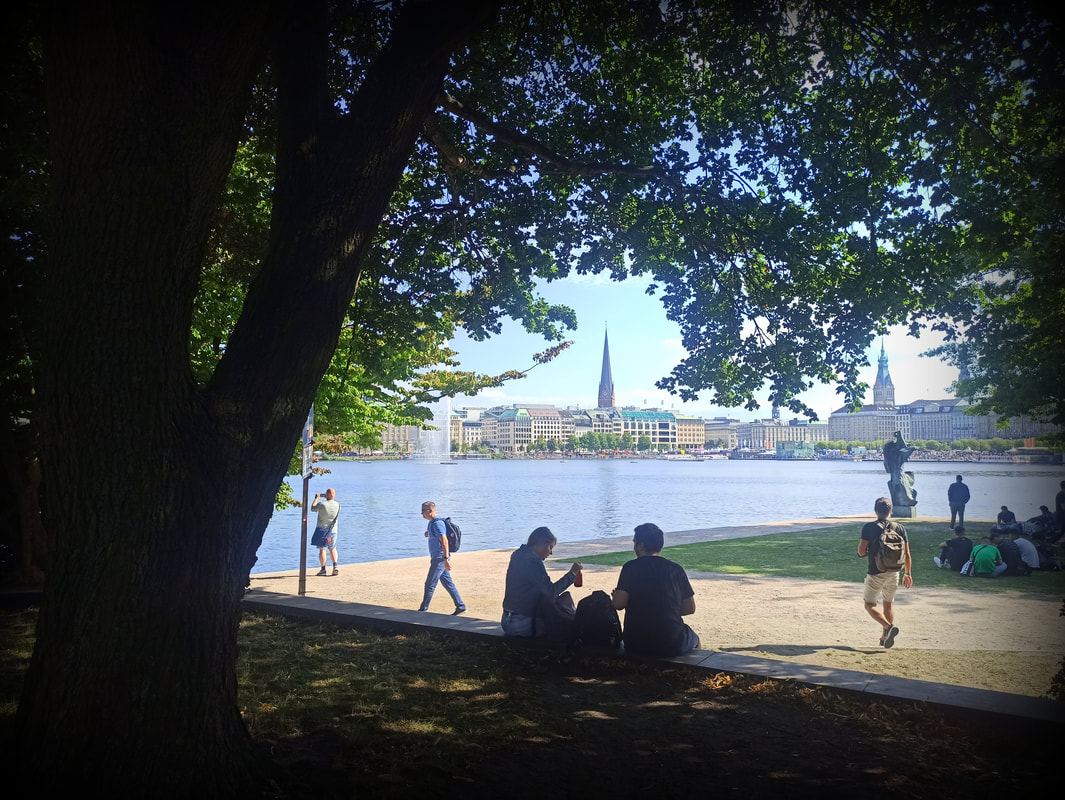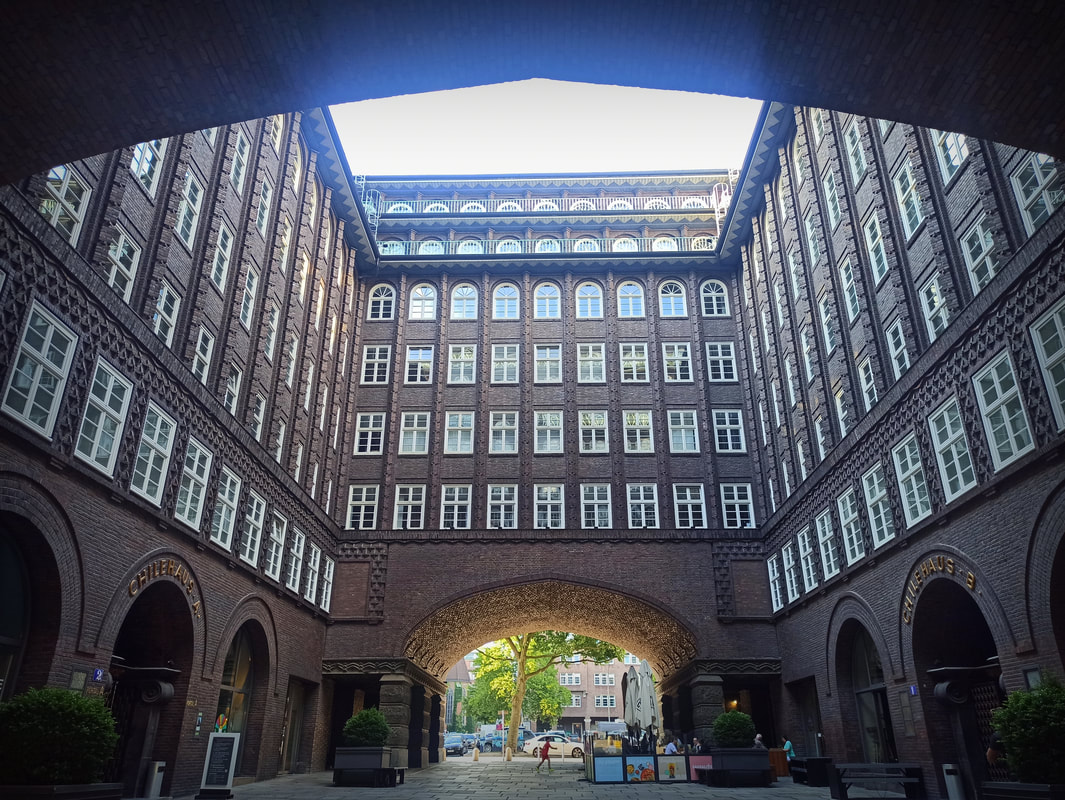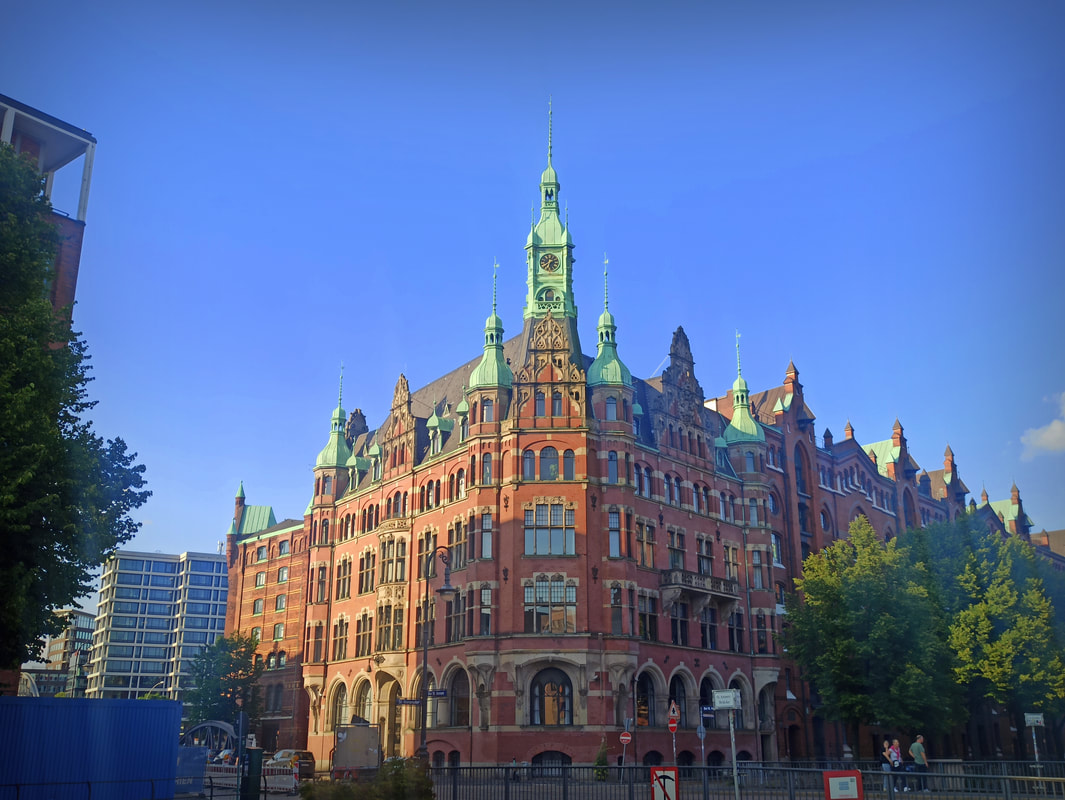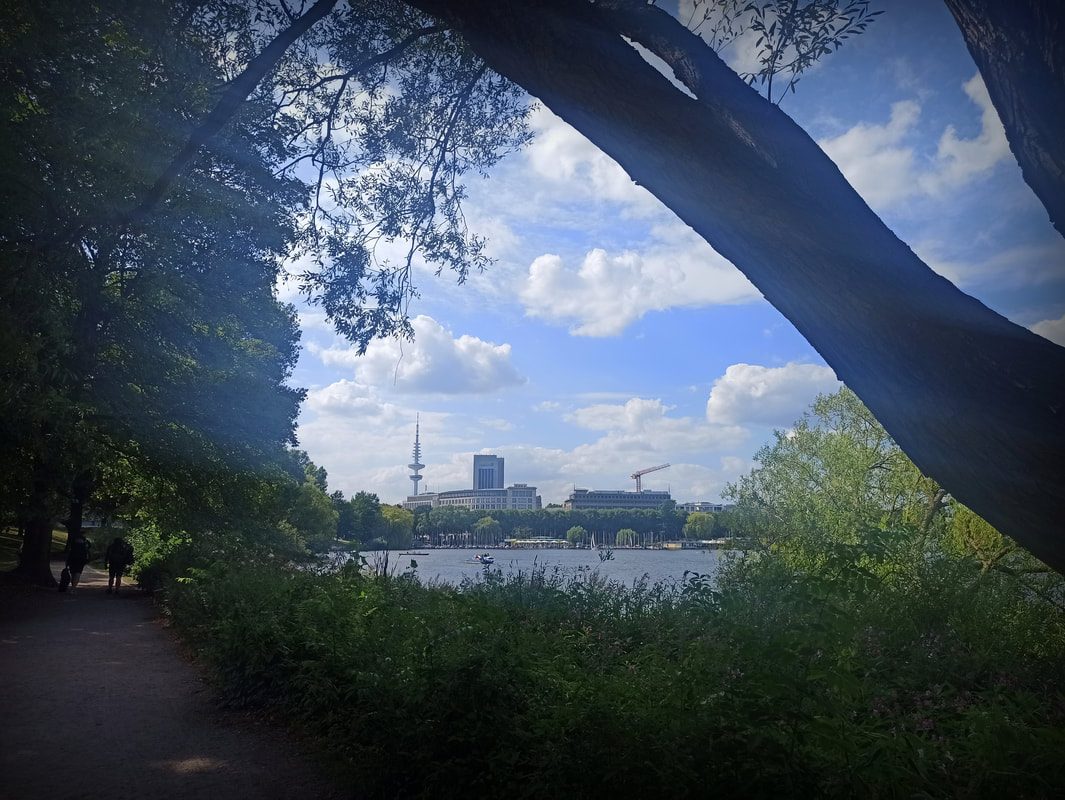Hamburg
Not in the story-mood? Scroll down for the Quick Budget Fact Overview: an itemized information summary of Hamburg! ↓
Some places in the world you only know due to one random fact, but they otherwise mean nothing to you. Like: “Aha yeah, that’s where hamburgers come from.” No, I’m not talking about some place in the US. I mean Hamburg! Hamburgers are from Hamburg, of course, and then McDonald’s just ran with it. Who would guess that Hamburger-town, located in the north of Germany, is an absolute treasure of a destination though? Like, a potentially-my-favorite-one-in-the-country-except-of-all-time-favorite-Freiburg-destination? I feel like Hamburg found that delicate balance between preserving its historical heritage while embracing this typical German edgy modernity, without losing its own unmistakable identity. Not an easy task at hand… You either go full-on Nuremberg or develop to shit until Frankfurt am Main comes out, but to have that perfect coalition of both is something I feel Hamburg fully nailed.
Any time you’ll plan there will per definition be too short. So, if that is the case, while not focus on exploring what is free, as you won’t have time to see all 1’196 Tripadvisor listings anyway? Budget Bucket List has got you covered with this cheapskate itinerary.
Hamburg-For-Free Itinerary
Day 1: Innenstadt (City Center)
Any time you’ll plan there will per definition be too short. So, if that is the case, while not focus on exploring what is free, as you won’t have time to see all 1’196 Tripadvisor listings anyway? Budget Bucket List has got you covered with this cheapskate itinerary.
Hamburg-For-Free Itinerary
Day 1: Innenstadt (City Center)
Too busy to read now? No problem, save it for later!
Save on Get Pocket | Save in Browser Bookmarks| Save on Instapaper
Save on Get Pocket | Save in Browser Bookmarks| Save on Instapaper
Let’s cover the basics first: downtown! We’re gonna start our itinerary at the HafenCity, which the city council of Hamburg describes as ‘the most ambitious inner-city development in Europe’. It is indeed true that the whole cultural-heritage-meet-modernity-spiel I described in my little intro, is exactly what your see exhibited here. Expect an urban regeneration project with splendidly preserved historical elements in a smooth, contemporary jacket. Part of that area is my absolute favorite part of Hamburg, the UNESCO-crowned Speicherstadt: A former ‘tax-free zone’ within the Port of Hamburg transformed into a trendy warehouse district (the largest worldwide) marked by modernist and neo-gothic architecture. It’s absolutely fantastic, go there… go there now.
Not far away from the Speicherstadt you’ll find the ‘Kontorhaus Distict’, also part of the UNESCO-area, with the Chilehaus as one of its most remarkable sights.
Of a whole different calibre is the upcoming stop just passed the modern Domplatz: The Hygieia Fountain next to the Town Hall, which represents the goddess of cleanliness and health (if you ever wondered where the word ‘hygiene’ comes from). The impressive fountain was built to celebrate the end of the cholera pandemic in the 1890s, which cost more than 8,000 lives. While here, peak quickly around the corner to see the Rathausmarkt, the Old Town’s beautiful central square which, not-so-fun-fact, was once named the Adolf Hitler Platz. Yup. Talking about German history, let’s continue on to the Deichstrasse, the oldest street of Hamburg that was beautifully restored after the Great Fire of 1842, which killed 51 people and wiped 1,700 houses from the face of the earth. This street truly is a world of difference with the Renaissance-themed Colonnaden street, which we’ll check out tomorrow.
From the oldest to the largest: The Lutheran St. Michaels Church is Hamburg’s greatest. Pay special attention to the large bronze statue above the portal, representing Archangel Michael defeating the devil, as well as to the 132m-high copper-covered spire which functioned as a recognizable landfall mark for ships sailing down the river Elbe.
Dinner time already? Cross the Alter Elbpark to reach the Reeperbahn, which is the main street of the St. Pauli nightlife district. Nicknamed the “most sinful mile” (die sündigste Meile), the popular area also functions as the city’s red light district. The Spielbudenplatz is one of the liveliest squares in the area. Another option is the Schanzenviertel just up north, which is an upcoming trendy multi-culti neighbourhood, or do you prefer a budget-friendly picnic in the Dammtorpark (incl. a Japanese and Botanical Garden)?
Day 2: Further Out
Dinner time already? Cross the Alter Elbpark to reach the Reeperbahn, which is the main street of the St. Pauli nightlife district. Nicknamed the “most sinful mile” (die sündigste Meile), the popular area also functions as the city’s red light district. The Spielbudenplatz is one of the liveliest squares in the area. Another option is the Schanzenviertel just up north, which is an upcoming trendy multi-culti neighbourhood, or do you prefer a budget-friendly picnic in the Dammtorpark (incl. a Japanese and Botanical Garden)?
Day 2: Further Out
The cities that generally receive my uttermost respect and appreciation are those offering opportunities for natural escapes. Hamburg is such a city. The Falkensteiner Ufer, one of Hamburg’s beach areas, can be reached directly by train or by bus #112. How’s that for a refreshing start of the day? With more temperate weather, this area also allows for pleasant hikes through the Waldpark Falkenstein and along the coast towards the Treppenviertel (Stairs Quarter). This scenic seaside neigbourhood is known for its swirling alleys, traditional residences and rolling hills. A different world from downtown Hamburg!
Moving towards the city centre, you’ll pass several parks along the way, including the Hirschpark, Friedhof Nienstedten and the massive Jenischpark. The latter is the oldest landscaped park of entire Hamburg and its 43ha terrain also contains two museums (Jenisch House & Ernst Balach House). The Flottbek River flows right through the park, eventually connecting to the Elbe. If you’re not much of a hiker, it is also possible to start the day right here and enjoy the many beach strips of the Elbstrand you’ll encounter in this area while moving towards the city.
The first downtown stops are in the Altona area, where you can check out the Altona Fish Market (Altonaer Fischmarkt) and Altona City Hall. Altona, the most western borough of Hamburg, was originally founded as a fisherman village in 1535, after which it became a part of Denmark in 1640. Only in 1871 this area became part of the German Empire, to be merged with Hamburg as late as 1938. From here, it’s possible to take a ferry (#62) to the contemporary Dockland viewing platform. Following the shore and passing by the U-Boot Museum (not free), you can move on to the St. Pauli Piers, the largest landing bridges of Hamburg’s port, next to the Portugiesenviertel. The Portuguese Quarter is named after the main immigrant group who has settled here and shaped the gastronomy. In case you’re feeling like something different than Kartoffel mit Bratwurst for dinner?
Just north of this area you can find the Composers Quarter, being composed (HAHA) of six composer-themed museums (namely: the Brahms, Telemann, Bach, Hasse, Mahler and Mendelssohn Museums). Yes, you guessed it… all of these big shots of classical music come straight outta Hamburg. We’re ending the day at what is called the ‘Prachtmeile’ (mile of splendour): The Colonnaden shopping street. It was officially built as a fancy private street by wealthy property owners, but nowadays the Neo-Renaissance architecture and iconic columns giving the street its name can be admired by the public. It’s hard to imagine that this area used to be the location of the Gängesviertel, a former living quarter of winding labyrinths of extremely narrow alleys and passages… eventually demolished due to its poor hygiene and serious sanitary problems. How times have moved on!
Further out-of-town stops which are free of charge
Further out-of-town stops which are free of charge
Stops that are beyond walking distance include the Stadtpark in the northern district, spanning an area of no less than 148ha and originally built to counterbalance the disappearance of public spaces during the Industrial Age of Hamburg. An alternative is the Öjendorfer Park on the east-side of town or the Wilhelmsburg Island Park in the south. For ‘real’, non-human-made nature: The Naturschutzgebiet Wittmoor (a former concentration camp) offers a protected natural area full of hiking trails. It is located close to yet another nature reserve: the Duvenstedter Brook, offering a natural habitat for foxes and cranes. East of Hamburg the Naturschutzgebiet Stellmoorer Tunneltal offers a green escape, with the Boberger Dünen entailing a more varied alternative of dunes, heathland and marshland. In the southside of Hamburg, the Fischbeker Heide offers a day out in nature for the Hamburger urbanites.
Whereas Wittmoor offers little traces of Germany’s dark page of history, the Neuengamme Concentration Camp Memorial is still entirely intact. This location served as a work camp for political prisoners, notorious for its poor conditions of accommodation, sanitation and nutrition. By the end of the war, 43,000 people died here from exhaustion, disease, starvation and/or violence.
Another educational activity includes a free 2.5hr guided tour through the Energiebunker (in German and English), taking place at 2PM, 3PM and 4PM during the weekends. Discover the site where the city of Hamburg is energized in a green manner.
Some money to spare? Scroll down for the recommended paid activities and sights in the city of Hamburg!
Quick Budget Fact Overview
Germany Facts
Short History Recap
800: Emperor Charlemagne: Frankish ruler France & Germany → 843: break-up. 962: Otto I, Roman emperor. 1250: Independent territories. 1438: Albert I, Habsburg Dynasty. 1517: Luther → split protestants & catholics → Thirty Years War. 1806: Napoleon → ’13: defeat, Battle of Leipzig. ’71: Bismarck unifies Germany → Reichstach (elected parliament), Kaiser (emperor) still power. ’88: William II, colonial expansion. 1914-18: WWI → Germany defeated. ’19: Treaty of Versailles → Germany loses colony & land, pays reparations. ‘23: Hitler, head of National-Socialist (Nazi) Party, leads coup in Munich. France & Belgium occupy Ruhr over failed reparation payments. Hyper-inflation. ’24: Hitler’s Mein Kampf. ’29: Global depression. ’33: Hitler chancellor → ’34: proclaims Third Reich → ’35: re-arm, Nuremberg laws deprive Jews of citizenship. ’36: Berlin Olympics. ’38: annexation Austria & Sudetenland. Kristallnacht: attacks on Jews. ’39: invasion Poland → triggers WWII: Holocaust. ’45: Germany defeated. War crimes trials.’49: Germany divided → west: US/French/UK zone capitalist Federal Republic, east: Soviet zone communist Democratic Republic. ‘50s: Economic growth west. ’55: west Nato, east Warsaw Pact. ‘61: Berlin Wall. ’73: east & west join UN. ’89: Wall down. ’93: joins Maastricht treaty on EU. 2000: Merkel chancellor. ’01: End nuclear energy. Troops to Afghanistan (US). ’02: €. ’15: Migrant crisis.
Germany Facts
- Capital: Berlin
- Language: German
- Population: ± 83.2 mln (Hamburg: ± 1.8 mln)
- Sq km: ± 357,588 km² (Hamburg: ± 755.2 km²)
- Currency: Euro (€ - EUR)
- Electricity Outlet: F / 230 V / 50 Hz. Check here. https://www.power-plugs-sockets.com/germany/
- Country Code Phone: +49 (40)
- Emergency Phone: 112 (general), 110 (police)
- Visa: Germany is a part of the EU and Schengen Area. Find more info about Schengen visas here. Easy applications can be arranged via here.
- Vaccinations: None
- Climate: Marine West Coast Climate (Cfb)
- High season: May - September
Short History Recap
800: Emperor Charlemagne: Frankish ruler France & Germany → 843: break-up. 962: Otto I, Roman emperor. 1250: Independent territories. 1438: Albert I, Habsburg Dynasty. 1517: Luther → split protestants & catholics → Thirty Years War. 1806: Napoleon → ’13: defeat, Battle of Leipzig. ’71: Bismarck unifies Germany → Reichstach (elected parliament), Kaiser (emperor) still power. ’88: William II, colonial expansion. 1914-18: WWI → Germany defeated. ’19: Treaty of Versailles → Germany loses colony & land, pays reparations. ‘23: Hitler, head of National-Socialist (Nazi) Party, leads coup in Munich. France & Belgium occupy Ruhr over failed reparation payments. Hyper-inflation. ’24: Hitler’s Mein Kampf. ’29: Global depression. ’33: Hitler chancellor → ’34: proclaims Third Reich → ’35: re-arm, Nuremberg laws deprive Jews of citizenship. ’36: Berlin Olympics. ’38: annexation Austria & Sudetenland. Kristallnacht: attacks on Jews. ’39: invasion Poland → triggers WWII: Holocaust. ’45: Germany defeated. War crimes trials.’49: Germany divided → west: US/French/UK zone capitalist Federal Republic, east: Soviet zone communist Democratic Republic. ‘50s: Economic growth west. ’55: west Nato, east Warsaw Pact. ‘61: Berlin Wall. ’73: east & west join UN. ’89: Wall down. ’93: joins Maastricht treaty on EU. 2000: Merkel chancellor. ’01: End nuclear energy. Troops to Afghanistan (US). ’02: €. ’15: Migrant crisis.
FREE Sights / Activities Hamburg
PAID Sights / Activities Hamburg
See full list here.
Evening Entertainment
Local Festivals
Find all festivals here.
- Sights: Port of Hamburg, Harbor Piers, Alter Elbtunnel, Hamburg Town Hall, St. Michaels Church, St. Petri Kirche, Hamburger Dom, Rathausmarkt, Chilehaus, Hamburger Fischmarkt, Reeperbahn, Deichstrasse, Krameramtswohnungen (small trader’s guild), Dockland, Colonnaden, Altona City Hall, Spielbudenplatz, Alte Post Building, Hygieia Brunnen (fountains), Energiebunker, Steinwerder Viewpoint, Gänsemarkt, Kehrwiederfleet & more.
- Museums: Neuengamme Concentration Camp Memorial.
- Hikes / Nature: Planten und Blomen, Stadtpark, Boberger Duenen, Elbe Beach, Jenischpark, Falkensteiner Ufer, Altonaer Volkspark, Wilhemsburger Inselpark, Duvensteder Brook, Hirschpark, Öjendorfer Park, Fischbeker Heide, Stellmorer Tunneltal, Naturschutzgebiet Wittmoor.
- Interesting neighbourhoods: Speicherstadt, Alster (Jungfernstieg), Hafencity, St. Pauli, Treppenviertel Blankense, Portugiesenviertel, Schanzenviertel, Komponistenquartier, Cremon, Hamburger Gängeviertel (street art).
PAID Sights / Activities Hamburg
- Sights: St. Nikolai Memorial, Planetarium Hamburg, Flughafenmodell, Rickmer Rickmers Boat.
- Museums: Dialog in the Dark, International Maritime Museum, Chocoversum, Panik City, Kunsthalle Hamburg, Museum für Kunst und Gewerbe, Museum of Hamburg History, U-Bootmuseum, Ballinstadt Emigration Museum, Automuseum Prototyp, Panoptikum, Museumsschiff Cap San Diego, Coffee Museum Burg, Polizeimuseum, Johannes Brahms Museum, Deutsches Zollmuseum, Zaubermuseum Bellachini, Speicherstadtmuseum, Hafenmuseum, MARKK Museum am Rothenbaum, Spicy’s Gewürzmuseum, Telemann Museum, HSV Museum, Tropenquarium, Mineralogisches Museum, Ernst Barlach Haus, Altonaer Museum – Norddeutsches Landesmuseum, Bucerius Kunst Forum, Museum für Bergedorf und die Vierlande, Museum of Work, Medical Historical Museum Hamburg, Sammlung Falckenberg, Jenischhaus & more.
- Other: Miniatur Wonderland, Rattshern Brauerei, Gin Sul.
See full list here.
Evening Entertainment
- Nightlife Areas: St. Pauli (Reeperbahn / Grosse Freiheit / Hans Albers Platz), Altona (laidback), Sternschanze (alternative), Karoviertel.
- Theatres: Schmidt Tivoli, Elbphilharmonie, Stage Theatre an der Elbe, Hamburgische Staatsoper, Varieté im Hansa Theater, Mehr Theater am Grossmarkt, Theater Neuer Flora, Imperial Theater, Operettenhaus, Ohnsorg Theater, Stage Operettenhaus, Komödie Winterhuder Fährhaus, The English Theatre of Hamburg, Theaterschiff Das Schiff, Allee Theater, Thalia Theater, St. Pauli Theater, Kampnagel Center for Finer Arts, First Stage Theater, Altonaer Theater, Schauspielhaus Hamburg, Hamburger Engelsaal, Wunderkontor, Laeiszhalle.
Local Festivals
- Hell over Hammaburg – March / April
- Hamburg Harley Days – May
- Elb Jazz Festival – June
- Hurricane Festival - June
- Noisy Festival – July
- Habitat Festival – July
- Wacken Open Air (north) - August
- Vogelball Festival – August
- Reeperbahn Festival - September
Find all festivals here.
Budget Bites
Sleep Cheap
- Supermarkets: Rewe, Edeka, Netto, Penny, Aldi, Spar.
- Markets: Isemarkt (Tue-Fri 8:30-14:00), Goldbek Market (Tue, Thu, Sat 8:30-13:00), Turmweg Market (Thu 8:30-14:00), Volksdorf Market (Wed, Sat 8:00-13:00), Spritzen Market (Tue 8:00-14:00 / Wed 14:00-18:30 / Fri 8:00-18:30 / Sat 9:00-15:00), St. Pauli Night Market (Wed 16:00-22:00), St. Pauli Fish Market (Sun 5:00-9:30), Markzeit in der Fabrik.
- Local Dishes: Bratwurst (sausage), Schnitzel (breaded cutlet), Brezel / Pretzel (salted bread in heartform), Labskaus (beef-potato dish), Kartoffelsalat (potato salad), Bratkartoffeln (fried potatoes), Kartoffelknödel (potato dumplings), Reibekuchen (potato pancake), Saurbraten (pot roast with horse meat or beef), Saumagen (pig stomach), Himmel un Ääd (potato black pudding dish), Maultaschen (meat dumplings), Sauerkraut Soup, Rouladen (beef rolls), Hasenpfeffer (rabbit stew), Spargel (asparagus), Käsespätzle (cheese noodles), Schweinshaxe (pork knuckle), Rollmops (pickled herring rolls), Apfelstrudel (apple dessert) Spaghetti Eis (icecream), Bratapfel (caramelized apple).
- The Veg Situation: Going veg is not so complicated in Germany, as it’s rather trendy to be plant-based in Westerm Europe. A veg restaurant guide can be found here. Local vegetarian dishes: Brezel, Bratkartoffeln, Kartoffelknödel, Reibekuchen, Sauerkraut Soup, Spargel, Käsepätzle (egg noodles) & the mentioned desserts.
- National Drink: Beer (Pilsner), Schnaps.
Sleep Cheap
- Hostels / Hotels: Germany is definitely not a cheap country, accommodation-wise. To keep inside a limited budget, you’ll have to focus on hostels… and even those can be pricy. Without being paid to say so, I love Booking.com: They have the biggest selection, are transparent about the final price and have an efficient search engine tailored to your specific needs (cheapest first!). If you use it often enough, Genius-discounts are applied. Agoda is often not transparent about prices, adding a lot of additional costs in the last booking-step. Opodo is another decent option. Air BnB is not what it used to be, price-wise, and seem to focus on the more upscale boutique stays nowadays.
- Couchsurfing: allows you to stay with locals. Nowadays it has a moderate sign-up cost (unless you put a third-world country as homebase), but paying extra for verification is unnecessary: Positive reviews are way more important. Once active, there are no costs for staying at someone’s house. In order to get accepted, make sure to write an elaborate review explaining why you applied to this specific profile and think you and your host are a good match (copy-pastes tend to be ignored). The Couchsurfing community in Germany is rather big and finding a host shouldn’t be too complicated.
- Housesitting: is an amazing exchange allowing you to stay short- or long-term in somebody’s house, while looking after their house and pets. There are many different websites, most of them paid… but once you landed a sit, the subscription fee pays itself back quickly. The main housesitting site is Trusted Housesitters.
- Wild Camping: is not legal in Germany. In order to do so and avoid fines, vigilance must be practiced.
Mama Said
Transport
Next?
- Safety: Germany has a relatively low crime rate, besides pick-pocketing. Be cautious in crowded areas.
- Tap Water: is drinkable.
- Ethics: Boycott zoos like Tierpark Hagenbeck and the Zoologisches Museum where animals are held in captivity out of their natural habitat.
- The best credit/debit card for traveling is Wise, as they use the live conversion rates with minimal exchange fees. Wise also has the lowest fees for sending money to foreign accounts. Revolut is comparable, but they have higher exchange fees in the weekend and less wallet-options. Also, you can only wire money to Revolut in the currency you opened the account with, whereas Wise has IBAN’s from a wide variety of currencies, so you don’t have to pay a double exchange fee.
- Simcard: Germany is part of the EU, so if you already have a European sim it will work here as well. However, depending on where you’re from, it could be cheaper to buy a temporary prepaid sim in Germany, available at the phone stores, convenience stores, Mediamarkt, gas stations or (more expensive) at the airport. Holiday or tourist packages are generally more expensive. That said, the prepaid packages are not so cheap either, including very little data for pricy package deals and high charges per minute for calling. Phone companies include T-Mobile, Vodafone, O2, Aldi and Freenet. The cheapest rates are offered by Lebara, but I have very bad experiences with this company. Note that simcards need to be registered, which happens in person or by videocall.
Transport
- Walking: It is convenient to explore Hamburg’s central area on foot, as even though it is a rather big city, the main sights are not too spread out.
- Cycling: Hamburg is cyclist friendly, owning more than 1700km of cycling paths. There is a public bicycle sharing network called Stadtrad. More info here.
- City Buses / Tram / Metro: There are U-Bahns (underground lines / metro), S-Bahns (suburban lines), railway lines, bus lines and even ferry lines over the river Elbe. All of them are operated by HVV and the same ticket (to be bought online or from the ticket machines) can be used for all, the price being determined by the amount of zones you’re crossing. Public transport operates until 1AM. A route planner can be found here. The up-to-date prices of single, day or week tickets can be found here.
- Taxi / Uber: Hamburg has several taxi companies as well as Uber. Find the taxi phone numbers on this page.
- Intercity Buses: Hamburg is connected to German and international destinations by bus. The central bus station is called ZOB, located at Adenaueralle 78 on top of Hauptbahnhof Süd serving U-Bahn lines U1 and U3. Flixbus also operates from here.
- Car Rental: This is not a cheap endeavour in Germany. However, the best deals can generally be found when the car is picked up from the airport.
- Airport: Hamburg Airport (HAM).
- Hitchhiking: is relatively safe in Germany yet rather uncommon. That said, it is a good option.
Next?
- National Destinations Close By: Bremen, Kiel, Lübeck, Rostock, Hanover.
- International Destinations Close By: Denmark, The Netherlands, Poland, Czechia, Austria, Switzerland, France, Belgium, Luxembourg.
In order to support the travelers’ community, I spend many hours per week to adequately document all information and advices for prospective visitors, accompanied by a (hopefully) entertaining insight into my personal observations and experiences. This service is and will remain free. However, if you voluntarily want to make a contribution and support my travels and thus the creation of new stories and information supply, here is the button you’re looking for:
Related:
- German Gems: Aachen, Frankfurt, Heidelberg, Dusseldorf, Cologne, Mulheim, Osnabruck, Baden-Baden... and of course Freiburg!
- The world's biggest metal festival: Wacken Open Air
- The perfect daytrip from Aachen: Maastricht & Southern Limburg gems
- More of the Netherlands: Den Bosch, Haarlem & Nijmegen... and 10 typical Dutch celebrations you shouldn't miss out on
- More metal in Holland: Into The Grave Festival in Leeuwarden
- Discover more Belgium: Antwerp & the most kick-ass Flanders itinerary!
- Europe's best skiing & hiking: Get your ass over to jaw-dropping Switzerland!
- Visit Europe's mini-countries: Gibraltar, Liechtenstein, Luxemburg, Kosovo & Wales!
- Relive history in Austria's majestic capital Vienna
- Unravel the mysteries of Serbia
- More European city-tripping: Copenhagen [Denmark], Vilnius [Lithuania], Frankfurt am Main [Germany] or Glasgow [Scotland]
- Where city and nature meet: Edinburgh, Scotland
- Budget Bucket List hitchhike trip to... Kosovo!
- The prettiest historical town in Romania: Sighisoara!
- The 3 golden rules to travel Sofia on a budget! & Why you shouldn’t miss out on Plovdiv! [Bulgaria]
- Discover the splendours of Turkey: Istanbul on a Budget & Reasons to visit Edirne
- German Gems: Aachen, Frankfurt, Heidelberg, Dusseldorf, Cologne, Mulheim, Osnabruck, Baden-Baden... and of course Freiburg!
- The world's biggest metal festival: Wacken Open Air
- The perfect daytrip from Aachen: Maastricht & Southern Limburg gems
- More of the Netherlands: Den Bosch, Haarlem & Nijmegen... and 10 typical Dutch celebrations you shouldn't miss out on
- More metal in Holland: Into The Grave Festival in Leeuwarden
- Discover more Belgium: Antwerp & the most kick-ass Flanders itinerary!
- Europe's best skiing & hiking: Get your ass over to jaw-dropping Switzerland!
- Visit Europe's mini-countries: Gibraltar, Liechtenstein, Luxemburg, Kosovo & Wales!
- Relive history in Austria's majestic capital Vienna
- Unravel the mysteries of Serbia
- More European city-tripping: Copenhagen [Denmark], Vilnius [Lithuania], Frankfurt am Main [Germany] or Glasgow [Scotland]
- Where city and nature meet: Edinburgh, Scotland
- Budget Bucket List hitchhike trip to... Kosovo!
- The prettiest historical town in Romania: Sighisoara!
- The 3 golden rules to travel Sofia on a budget! & Why you shouldn’t miss out on Plovdiv! [Bulgaria]
- Discover the splendours of Turkey: Istanbul on a Budget & Reasons to visit Edirne
